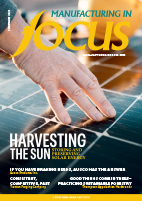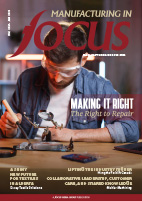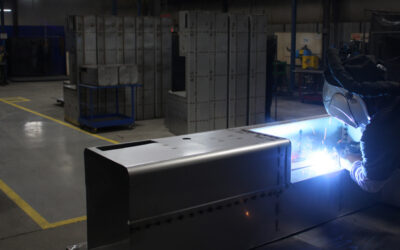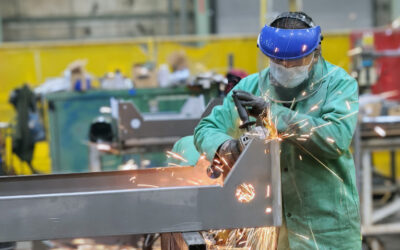The Mansonville Plastics Group of Companies in Surrey, British Columbia makes products from expanded polystyrene (EPS)—the technical term for the white foam plastic commonly used for packaging and containers. The company is working hard to grow its business while at the same time combatting stereotypes about its main manufacturing material. Mansonville officials are passionate about the environment, their workforce and opportunities for future growth.
~
“We have three operating divisions,” says Chief Financial Officer, Hussam Kaddoura. “Mansonville Plastics (B.C.) Ltd. does block moulding, First Choice Manufacturing Ltd. does shape moulding and Korolite Engineered Panel Structures Ltd. does insulated panels… All are distinct legal entities. We operate from the same plant, however, with the same staff. Each [company] has its own name and identity in the market they operate in.”
Markets served include residential and commercial construction, infrastructure, seafood and aquaculture, marinas, packaging, cold storage and food processing plants, landscaping, reforestation, nurseries, green houses, agriculture, and more.
The Mansonville Plastics division generates the lion’s share of revenues (nearly 60 percent in fiscal year 2017) for the overall operation. This division manufactures, processes and recycles block moulded EPS used for mouldings, rigid insulation, roofing, floatation, lightweight fill, contour, signage and other products.
First Choice manufactures and processes shape moulded EPS products such as seedling containers, cooler boxes for perishables and seafood, protection packaging, and more.
The Korolite Engineered Panel Structures division, meanwhile, manufactures and processes panels that are insulated with EPS foam. These panels are used in the construction, infrastructure, cold storage and food processing sectors.
A Mansonville product called Korolite EPS Geofoam, meanwhile, is lightweight fill material increasingly being used underneath highways, bridge abutments and the like during road and bridge construction. All three companies operate out of a 73,000 square foot manufacturing facility on a 9.5 acre site. Mansonville sells most of its EPS block-moulded products in its home province, and exports a great deal of its shape moulded products to Washington, Oregon, California and other western states.
“The core strength of the business is diversification,” says Kaddoura. “We are well diversified into different product lines and different industries. That’s given us our strength. So when one industry suffers a slowdown or there are seasonal effects on business, our other divisions or industries make up for that.”
In addition to its flexibility, Mansonville is extremely proud of its green reputation. EPS waste is fully recyclable and the company does not use CFCs (Chlorofluorocarbons) or HCFCs (Hydrochlorofluorocarbons) to make its products, as both substances can be ecologically damaging. Not only does Mansonville avoid using CFCs and HCFCs, “we don’t introduce any other chemicals. The main component added to this product is just steam – clean steam generated through our boilers. The product starts in resin [form] and we use steam to expand it,” says Kaddoura.
This eco-friendly approach has earned the company industry kudos. Among other honours, Mansonville won a 2016 Surrey Environment and Business Award and a Corporate Social Responsibility Recognition Award in 2015 from the Surrey Board of Trade. In 2017, the company received an Honourable Mention from EPS Industry Alliance in its Excellence in EPS Recycling Award.
Mansonville has been involved with an impressive portfolio of projects. The company provided Korolite Geofoam, for example, for the Columbia Bitulithic Mufford/64th Avenue Overpass project in 2014, the BA Blacktop Roberts Bank Rail Corridor project in 2013 and the Deltaport Terminal project in 2014, all in BC. Mansonville’s EPS foam moulded seafood containers are highly popular and can also house any temperature-sensitive items such as frozen food or perishable fruits, vegetables and herbs. Meanwhile, the firm’s seedling growing containers are commonly used for tree-planting activities in the reforestation sector.
The company’s roots are decades-old, and can be traced to a different province, thousands of miles away. The firm was founded in 1959 in Mansonville, Quebec (hence the company name). When the company started, it focused solely on manufacturing rigid insulation. Business grew, and Mansonville expanded across Canada.
In the early 1980s, the original owners sold the operation. In 1981, Mario Cormier acquired the BC division and company name. The firm continued to grow, adding new products and services. The First Choice Manufacturing division was added in 1984 followed by the Korolite division in 2001.
In May 2015, Cormier passed away, and his wife, Dona Hurry, became president of Mansonville. Hurry receives praise for her managerial style.
“She trusts and has empowered the management team to look after day-to-day operations. She engages team members, empowers people to take ownership and come up with solutions and ideas together. The last three years, our business has grown very strongly,” says Jack Liu, Corporate Controller & Business Development Officer.
Evidently, Mansonville employees aren’t the only ones who appreciate Hurry’s talents: last year, she won the 2017 Surrey Women in Business Corporate Leadership Award. In addition, Mansonville was nominated for the Canadian Chamber of Commerce Private Business Growth Award for 2017 and 2016.
At present, Mansonville has roughly 80 employees across all divisions, and the firm is proud of its ability to retain staff. “We have a lot of long-term knowledgeable people. Our key staff have been with us an average of 16 years. We’re a very family-oriented company, not only to staff, but also to customers. Our customers appreciate that personal relationship,” says Liu.
“We like team players and people who are willing to learn. We invest a lot in education and training people. We’ve built a culture where we’re very open to sending people to conferences, training seminars and trade shows,” adds Kaddoura.
The company also places a strong emphasis on workplace safety. To this end, Mansonville has partnered with the Manufacturing Safety Alliance of BC, a service provider that works with companies in the province. The Alliance “helped us implement a health and safety program specific to our company,” says Liu. The firm also created a Joint Health and Safety Committee that examines workplace safety issues.
Likewise, there’s a major focus on quality in Mansonville. The company’s products for the construction sector meet or exceed the National Standard of Canada (Can/ULC-S701-96).
“We have an in-house QA (Quality Assurance) program. We have an in-house quality lab. We do analysis of random products. We do in-production testing for size verifications and weight and density verifications… We’re also under a third-party certification program through Intertek testing,” says General and Sales Manager, Bob Teperto. The company is registered with third-party certification organization, ULC as well.
In addition to these industry certifications, Mansonville belongs to several trade associations, including the EPS Industry Alliance, Canada Green Building Council, Vancouver Regional Construction Association, Roofing Contractors Association of BC, Surrey Board of Trade, and others.
Going forward, the company has a plan to increase the level of automation in its plants. There are several drivers behind this move, including a desire to bolster the bottom line and the challenge of attracting new workers.
“Like a lot of manufacturers, especially in BC, we’ve been faced with labour shortages. We find it difficult to find skilled workers in our industry. There have been changes in minimum wage, the cost of living is going up. This puts more pressure on us as manufacturers being able to find people and being able to compete in a fairly competitive market. This leaves us with no choice but to look to automation,” says Edmund Tiu, Plant Manager.
“We work closely together with industry leading experts from various fields such as machine programming, controls, and conveying systems, etc. to develop automation processes to gain efficiency and reduce cost,” says Tiu.
Plans are afoot to “automate a lot of our processes, especially repetitive processes that we do. Efficiencies will be gained. In recent years, the cost of automation has gone down. We’re looking, over the next five years, at investing a fair bit into automating,” says Kaddoura. Automation might also help cut costs—a highly desirable outcome given soaring property prices in the region.
“Real estate is getting very expensive in Lower Mainland BC. And our business is focused on expanded polystyrene, which is a bulky, lightweight product that takes a lot of room. We face limitations with real estate being so expensive,” says Liu.
Mansonville has a reputation for doing outreach work with students and the community. “When an opportunity opens up, we have a co-op student take an internship with us… They bring new ideas into our company. It’s also a good way to pass on our knowledge to the younger generation,” says Liu.
The late Mr. Mario Cormier was a strong believer in corporate social responsibility. The company is actively engaged in various public projects to promote the recycle and reuse of EPS materials. Mansonville also arranges plant tours for students. This is done to interest potential new employees and to clear up “misconceptions about polystyrene,” states Liu, the main misconception being that expanded polystyrene “can’t be recycled… in fact, expanded polystyrene can be recycled and made into a new product,” he continues.
The company conducts another form of outreach as well, attending workshops in British Columbia aimed at introducing new immigrants to the job market. “We’re a very multicultural environment. We work with government integrating newcomers to the country and into the job market,” says Kaddoura.
In terms of promotion, Mansonville “attends industry trade shows. We work with some magazines… We do some social media,” says Teperto. “Our latest focus has been more online. A lot of people, when searching for construction products, tend to Google. We’ve started an ad campaign on Google ads, to try and market online,” adds Kaddoura.
The company continues to innovate and tweak existing products. “We’re always trying to introduce new products and upgrade our machinery,” says Kaddoura.
As for the future, “First, we want to maintain the status we have in the market. We want to maintain our name and integrity. We want to push ahead as an environmentally friendly company. We’re looking forward to growing the business slowly but surely and diversifying, adding new products and new applications for our products,” he says.













